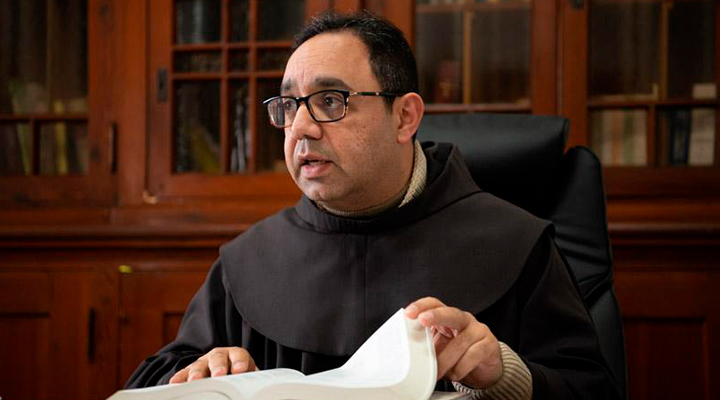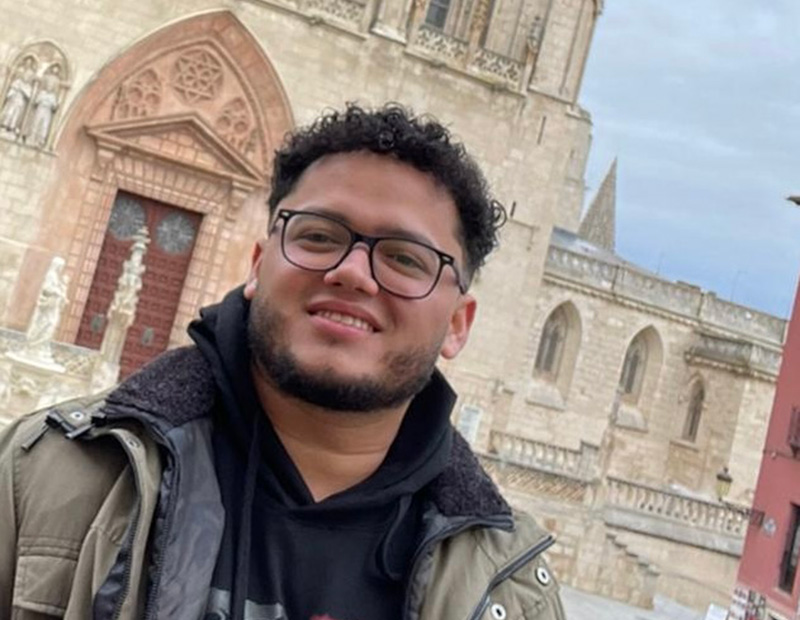
- It is a pleasure to greet you, dear Father Marwan, especially in these days when we are again watching on TV and reading in the newspapers about the conflicts that are shaking Jerusalem and the Holy Land. Talking to someone who is committed to institutional communication and Christians in the Holy Land, helps us to understand how great is the complexity of that part of the world. And you are an example of this complexity.
Yes, I was born in Jerusalem in 1974 in an ecumenical family. My father was from the Orthodox Church and my mother is from the Latin Church. As you anticipated, I was baptized by the Melkites, because my mother's uncle was a Melkite priest. When I was born, he asked my parents to be able to baptize me himself, and he did it according to his rite. After that, my parents wanted me to go to one of the best schools we have in Jerusalem. So they enrolled me in the Anglican school. And in the end, with an Orthodox father, a Latin mother, baptized by the Melkites and educated by the Anglicans, I finally entered the convent of the Franciscans of the Holy Land.
- Well, something very fascinating but not very easy to understand for those who do not live in the East and do not know this complexity...
And mind you, my first contact with the faith was, in fact, in the Anglican Church. At school we went to church to pray, obviously according to the Anglican rite. At the same time, my parents would send me to the oratory of the parish church, which was a Latin parish. I went once a week and as often as I could. At that time I met some young friends, not from school but from the neighborhood, who were part of the Franciscan Youth of the Old City of Jerusalem. I joined them because I liked the way they met to pray and meditate on the Word of God. Little by little I got to know the Franciscan friars better and I began to feel God's call to be part of this Franciscan fraternity.
At the end of my last year of high school, I had already decided to enter the friary for a trial of Franciscan life with the friars of the Custody of the Holy Land. My parents were strongly opposed. However, after much insistence on my part, they allowed me to enter the friary.
- An Israeli citizen, of Arab-Palestinian ethnicity, of Christian faith and, moreover, raised among several confessions and rites. How do you live this complex identity?
Certainly, as a Palestinian native of Jerusalem, which is in fact in Israel, a country of so many ethnicities, with a really diverse ecclesial background, it has not been and still is not at all easy... Well, notice that in Jerusalem everyone would like to have a small place.
And it has not been easy, first of all, because in Holy Land a person has to adapt to so many mentalities and so many ways of existing. And I'm not just talking about Arab Israeli citizens, but also about the many different mentalities of so many pilgrims who visit the Holy Land all the time, and often so many foreigners who live there. On the one hand, their presence can be a challenge; on the other hand, it is also a richness. A challenge because it is necessary to have both an ecumenical spirit and an interreligious openness. The richness lies in knowing how to grasp and appreciate the best messages of all these cultures.
- How many Christians are there in the Holy Land, of what confession and what are their particular needs?
Christians in the Holy Land are from many different churches. There is the Catholic Church, the Anglican Church, the Protestant Church, as well as the Orthodox Churches. However, we Christians live together in great harmony of faith, because we believe in the same God and savior Jesus Christ. Our absolute need is to affirm our existence and presence, as a united body, because we are less than 2 % of the population of the Holy Land (the State of Israel alone has almost 9.5 million inhabitants). So we are really a minority.
It is normal for there to be this need for self-affirmation and to say that we are really present. In fact, we are present from the scientific and educational point of view, from the administrative point of view, in the world of work and business, and also from the point of view of faith.
- And this aspect of faith and dialogue is very important, as we know that Christians play a special role in peace talks, thanks to having the best schools in the country. Statistically, they are the most successful in their studies, especially in fields such as medicine. And they are a real factor of national unity, even if they are squeezed between the two major majority denominations: Judaism and Islam.
Indeed. We are one of the components that make up the society living in the Holy Land, among Christians, Muslims, Jews, Druze and others. What happens on a socio-political level in the whole society, happens to us as well. And what others may experience, we experience as well. But being in the minority means that we are steadfast. We are present, in fact, in many areas, as you rightly said. We are also influential thanks to the support of the Church.
- You are currently studying Institutional Communications at the Pontifical University of the Holy Cross. When you finish your studies, what will be your apostolic goals? We would like you to tell us about your career before coming to Rome.
I have been very involved in the apostolate and pedagogical formation. I was the director of a school for 15 years and was also a parish priest both in the city of Bethlehem and in the parish of the city of Nazareth. In addition, I worked in various educational and pastoral settings, such as in the "Casa del Fanciullo", a center for children with particular disorders, both physical and social. Now my course is changing, in a sense of the method of my work. However, the goal remains and will always remain to serve the word of God, to promote and proclaim his message of salvation. Evangelization is the key word of my study.
For this reason, I am currently training with a view to returning and working in the Christian Media Centre of Jerusalemwhere I will be able to evangelize through the media in my country. I would like to transmit the voice of Christians in the Holy Land nationally and internationally, because our voice makes it clear that we are the living stones of the Land of Jesus, and our life is a mission, a vocation to persevere in the faith. Representing the true identity of the Christians of the Holy Land is a duty, and if I really want to do it, I have to know how to do it, that's why I chose to study Social and Institutional Communication at the Pontifical University of the Holy Cross in Rome.
- And in this sense, it is also important the contribution of our benefactors, who help you and other students from all over the world to be properly trained in order to serve each one in their particular reality...
Of course! In Arabic it is said that the word 'yes' is a word blessed by the Lord, because it shows adherence to His plan, and adherence in turn shows faith. You, dear benefactors of the CARF Foundation, have given a testimony of faith by adhering to the request for help made by our Pontifical University of the Holy Cross, which is forming people who will be able, thanks to this preparation, to work better in the Lord's field, so your 'yes' is truly blessed by the Lord. It will bring you all his blessings, because in an indirect way you have participated in spreading the word of God in the message of salvation. You are our partners in evangelization. For this, I thank you and pray for you, and the Lord will know how to reward you for your generosity.
- Thank you very much, dear Father Marwan... And as they say in the Holy Land... Shalom, Salam!
Gerardo Ferrara
BA in History and Political Science, specializing in the Middle East.
Head of the student body at the Pontifical University of the Holy Cross in Rome.
